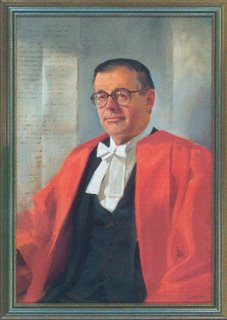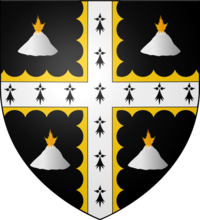Robin Cooke, Baron Cooke of Thorndon facts for kids
Quick facts for kids
The Lord Cooke of Thorndon
ONZ KBE PC
|
|
|---|---|
 |
|
| President of the Court of Appeal | |
| In office 1986–1996 |
|
| Preceded by | Sir Owen Woodhouse |
| Succeeded by | Sir Ivor Richardson |
| Personal details | |
| Born | 9 May 1926 Wellington, New Zealand |
| Died | 30 August 2006 (aged 80) Wellington, New Zealand |
| Spouse |
Annette Miller
(m. 1952) |
| Children | 3 |
| Parent |
|
Robin Brunskill Cooke, Baron Cooke of Thorndon (born May 9, 1926 – died August 30, 2006) was a very important judge from New Zealand. He later became a special judge in Britain called a Law Lord. He was also part of the Judicial Committee of the Privy Council, which is like a high court for some Commonwealth countries.
Many people think he was one of New Zealand's most important legal thinkers. He is the only New Zealand judge ever to have served in the House of Lords in the United Kingdom. From 1997 to 2006, he also worked as a judge for the Court of Final Appeal in Hong Kong.
Contents
Early Life and School
Robin Cooke was born in Wellington, New Zealand. His father, Philip Brunskill Cooke, was also a judge in the Supreme Court. Robin went to Wanganui Collegiate School.
He studied law at Victoria University College and then at Clare College, Cambridge in England. He earned several degrees, including a Master of Laws (LL.M.) and a PhD.
In 1952, he married Annette Miller. They had three sons. One of their sons, Francis, also became a judge in the High Court in 2018 and the Court of Appeal in 2024.
A Career in Law
Robin Cooke became a lawyer in New Zealand in 1950. He also became a lawyer in England in 1954. For nearly 20 years, he worked as a lawyer in New Zealand.
In 1964, when he was only 38, he was made a Queen's Counsel (QC). This is a special title for experienced lawyers. He was the youngest person in New Zealand to get this title, even younger than his father had been.
In 1972, he became a judge in the New Zealand Supreme Court (which is now called the High Court). In 1976, he moved up to the New Zealand Court of Appeal, which was the highest court in New Zealand at the time. He became the President of that court in 1986 and held that important role for 10 years.
When he retired from the Court of Appeal in 1996, he was given a special title: Baron Cooke of Thorndon. This made him a member of the Appellate Committee of the House of Lords in Britain, where he worked as a Law Lord until 2001.
He also served as a judge in other countries, including Samoa, the Cook Islands, Kiribati, and Fiji. He was also a judge in the Hong Kong Court of Final Appeal.
Robin Cooke was the only judge from the Commonwealth (a group of countries that used to be part of the British Empire) in the last 100 years to serve in the House of Lords on cases from the United Kingdom. He worked on almost 100 cases there.
Robin Cooke passed away in Wellington on August 30, 2006.
His Ideas and Impact on Law
Robin Cooke is New Zealand's most famous judge. Many believe he was the best judge the country has ever had. He is especially known for his work in two main areas:
- Administrative Law: This is about making sure government bodies and officials act fairly and legally.
- Treaty of Waitangi: He helped the law recognize the important agreement between the Crown and Māori people.
Cooke strongly believed that New Zealand's laws should be developed independently, not just follow English laws. In 1956, he felt New Zealand judges were too quick to simply copy English court decisions. By 1988, he was happy to say that New Zealand law was "very considerably different from English law." This change was partly thanks to his own efforts.
However, he also believed that different countries could still learn from each other's laws. He thought it was good to look for common ideas, as long as each country's unique way of life was respected.
Administrative Law Ideas
Lord Cooke believed that courts should be able to step in and review government actions, even if the law didn't specifically say they could. He once famously said that some basic common law rights might be so important that even Parliament (the law-making body) couldn't take them away. This idea was different from the common belief that Parliament's power was always supreme.
In a case called Bulk Gas Users Group v Attorney-General, Justice Cooke said that even if a law tried to stop courts from reviewing a decision, the courts would be "slow to conclude" that they couldn't look at a legal question. This showed how much he believed in the courts' role in making sure laws were followed fairly.
He took a similar approach in 1985 in the case of Finnigan v New Zealand Rugby Football Union. He allowed lawyers to try and stop the New Zealand Rugby Union from touring South Africa. This tour was controversial because of South Africa's apartheid system at the time. The tour was later cancelled.
Perhaps his most famous administrative law case was Simpson v Attorney-General, also known as Baigent's case. In this case, the police mistakenly searched the wrong house. The person living there hadn't done anything wrong, so there was no clear way to fix the police's mistake. The Court, led by President Cooke, decided that if people's human rights (protected by the New Zealand Bill of Rights Act 1990) are broken, they should get a proper solution, like money for damages. He said the Court would "fail in our duty" if they didn't provide a way to fix such wrongs.
Treaty of Waitangi Ideas
In 1987, Cooke led the Court of Appeal in a very important case called New Zealand Maori Council v Attorney-General. This case looked at what Parliament meant by a section in a law that said the government must act in a way that is "consistent with the principles of the Treaty of Waitangi." The law didn't explain what these principles were, so the courts had to decide.
President Cooke explained that the Treaty created a lasting relationship, like a partnership, between the Crown and Māori. He said both sides had a duty to act in good faith, fairly, and honorably towards each other. This idea of partnership is still very important in how the Crown and Māori work together today.
Awards and Special Titles
Robin Cooke received many honors throughout his life:
- 1955: Won the Yorke Prize for legal writing.
- 1977: Made a Knight Bachelor, allowing him to be called "Sir Robin Cooke."
- 1977: Appointed to the Privy Council of the United Kingdom.
- 1977: Received the Queen Elizabeth II Silver Jubilee Medal.
- 1986: Made a Knight Commander of the Order of the British Empire (KBE).
- 1982: Became an Honorary Fellow of Gonville and Caius College, Cambridge.
- 1985: Became an Honorary Bencher of Inner Temple (a legal society in London).
- 1989: Received an honorary Doctor of Laws (LLD) from Victoria University of Wellington.
- 1990: Received the New Zealand 1990 Commemoration Medal.
- 1990: Received an honorary Doctor of Laws (LLD) from the University of Cambridge.
- 1991: Received an honorary Doctor of Civil Law (DCL) from the University of Oxford.
- 1993: Appointed to the International Commission of Jurists, a group that promotes human rights and the rule of law.
- 1996: Made a Life Peer, which meant he became Baron Cooke of Thorndon and could sit in the House of Lords.
- 2002: Became an Additional Member of the Order of New Zealand, the highest honor in New Zealand.
Since 2002, the Law School at Victoria University in Wellington has held an annual lecture in his honor. These lectures often focus on constitutional and administrative law, areas where he made a big impact.
Coat of Arms
|
See also
- List of King's and Queen's Counsel in New Zealand
 | Frances Mary Albrier |
 | Whitney Young |
 | Muhammad Ali |



